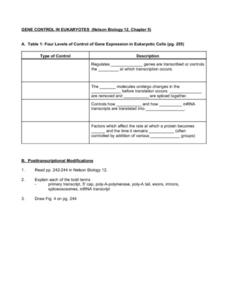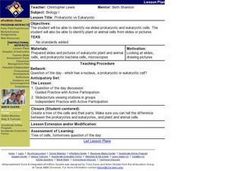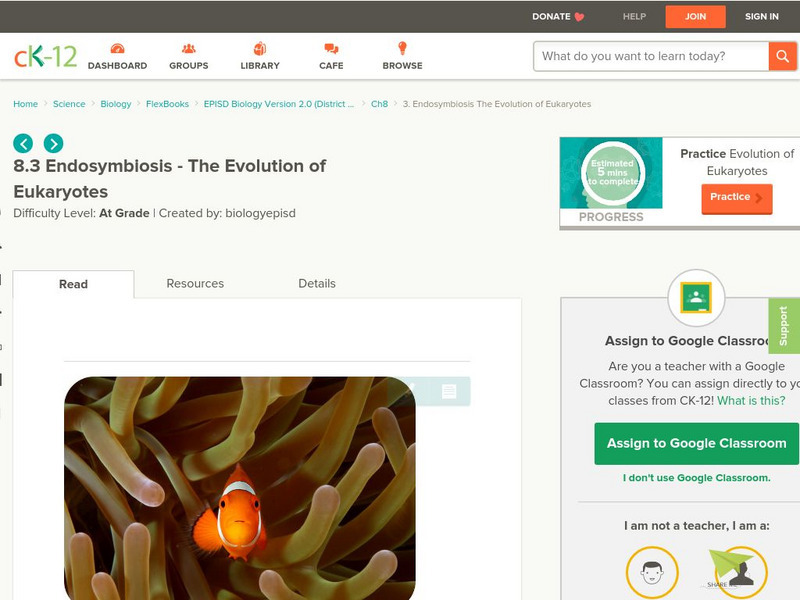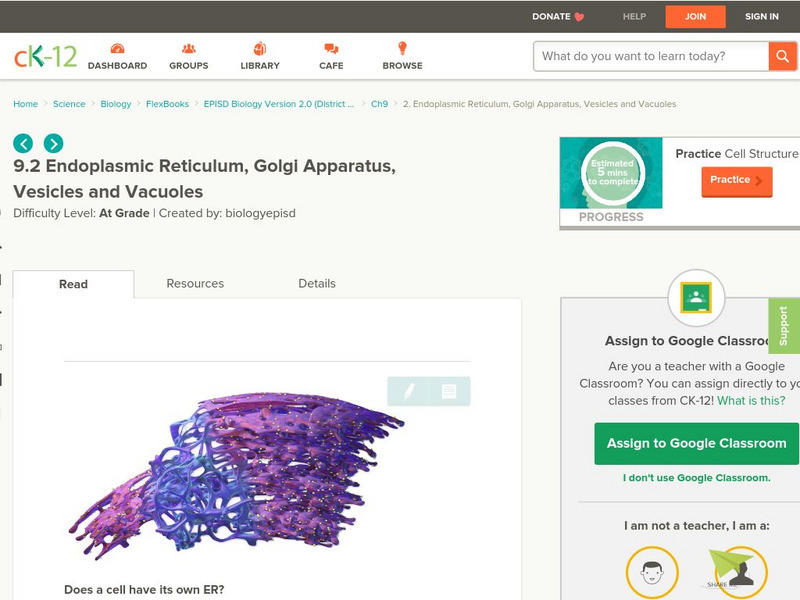Curated OER
Fungus
Students study fungus, its reproduction and uses. In this eukaryote instructional activity students complete several fungal experiments.
Curated OER
Eukaryotic or Prokaryotic #1
In this eukaryotic or prokaryotic quiz instructional activity, students complete an on-line quiz, choosing questions and matching answers. Students score 1 point for each correct answer; a printed version is available.
Curated OER
Eukaryotic or Prokaryotic #2
In this eukaryotic or prokaryotic quiz worksheet, students complete an on-line game, clicking on questions and matching answer cards and scoring 1 point per correct answer. Printable version available also.
Curated OER
Defining the Difference Between Prokaryotic and Eukaryotic Cells
Students examine microscopic life by conducting a scientific investigation. In this cell analysis lesson, students define the prokaryotic and eukaryotic cells and discuss their word origins. Students view each type of cell on slides...
Curated OER
Cell Theory, Scientists, & Cell Types
In this cells activity, students compare the characteristics of eukaryotic and prokaryotic cells. Students describe how different scientists contributed to the cell theory. This activity has 6 short answer questions and 1 graphic organizer.
Curated OER
Regulating Gene Expression
In this genes worksheet, students review the system that controls gene expression and the enzymes required for regulating genetic expression. This worksheet has 6 fill in the blank and 7 short answer questions.
Curated OER
Gene Control in Eukaryotes
In this gene control in eukaryotes worksheet, learners complete a table with information about the process of translation and transcription. Students also explain the process of post-transcription and the modifications involved.
Curated OER
Cell Growth and Division
In this biology worksheet, 9th graders identify and explain what cell stay in inter-phase. Then they describe which stage of cell is the shortest and determine why that is true. Students also explain the process of mitosis.
Curated OER
Prokaryotic vs Eukaryotic
Young scholars identify via slides prokaryotic and eukaryotic cells. They identify plant or animal cells from slides or pictures. Students are given the question of the day. They are asked which has a nucleus, a prokaryotic or...
Curated OER
Organelles
Students explore the functions of major eukaryotic organelles. They compare and contrast prokaryotic and eukaryotic cells. Given diagrams and drawings, students take turns drawing structures, discussing their function, and labeling...
Curated OER
Prokaryotic and Eukaryotic Cells
Students compare and contrast prokaryotes and eukaryotes. They name the organelles that are present in prokaryotes only and identify their functions. Students label the diagrams of the prokaryotic cell and the eukaryotic cell.
Curated OER
Cell 4 Organelles Review
Students list and define all of the major organelles in a eukaryotic cell. They identify the correct placement of all the major organelles in a eukaryotic cell. They examine cell membrane and its function.
Curated OER
In Cell-A-Bration of Cells
Sixth graders identify major cell organelles found in both animal and plant cells. Pupils observe a PowerPoint presentation based upon the features of a haiku. They create haiku science-based poem which describe the characteristics of...
Curated OER
Cells, The Structural and Functional Units of Life
Students observe the general structure and organelles of plant and animal cells. Students prepare microscope slides of elodea, onion, check, and cork and identify the cells by size and shape as unicellular, multicellular, plant or animal.
Curated OER
Sponges - A Coloring Worksheet
In this sponges instructional activity, students read the information about sponges. Students answer the provided questions about the reading passage. Students color the illustration at the bottom of the page.
Curated OER
Nutrient Biochemistry
For this nutrient biochemistry worksheet, students complete the blanks with information about nucleic acids and the process. Students also draw a figure referenced in the text given.
Curated OER
Biology Word Search
In this biology worksheet, 9th graders identify and locate various vocabulary terms found in the study of living things. There are 31 biology terms located in the word search.
Vision Learning
Visionlearning: Cell Biology: Membrane Bound Organelles
Evidence in support of endosymbiosis to show the evolution of organelles within cells.
Other
University of Cincinnati: Project Step: Antibiotics
STEM biology lesson where by designing their own antibiotics, students will gain an understanding of how the differences between prokaryotic cells and eukaryotic cells have played a role in their own health. They will also be able to...
CK-12 Foundation
Ck 12: Endosymbiosis the Evolution of Eukaryotes
[Free Registration/Login may be required to access all resource tools.] Learn about the evolution of eukaryotes which is explained by the endosymbiotic theory.
CK-12 Foundation
Ck 12: Common Parts of the Cell 1
[Free Registration/Login may be required to access all resource tools.] Online activity summarizes the cell theory, describes four parts all cells have in common, and the importance of the work of Robert Hooke and Anton van Leeuwenhoek.
CK-12 Foundation
Ck 12: Endoplasmic Reticulum, Golgi Apparatus, Vesicles and Vacuoles
[Free Registration/Login may be required to access all resource tools.] Overview of the structure and role of the endoplasmic reticulum, Golgi apparatus, vesicle, vacuole, and centriole. This tutorial also helps students distinguish...
CK-12 Foundation
Ck 12: Gene Regulation in Eukaryotes
[Free Registration/Login may be required to access all resource tools.] Gene regulation in eukaryotic cells is described along with the role of the TATA box and homeobox genes.
Department of Defense
Do Dea: Biology: Unit 3: Cell Structure
In this third unit of a Biology course, students learn about cells and cell structure. They compare prokaryotic and eukaryotic cells and learn about the specialized structures in a cell and what their functions are. They will also learn...

























